Truncated great icosahedron
| Truncated great icosahedron | |
|---|---|
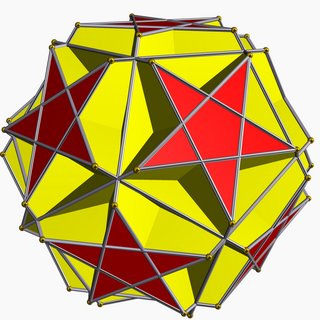
| |
| Type | Uniform star polyhedron |
| Elements | F = 32, E = 90 V = 60 (χ = 2) |
| Faces by sides | 12{5/2}+20{6} |
| Wythoff symbol | 2 5/2 | 3 2 5/3 | 3 |
| Symmetry group | Ih, [5,3], *532 |
| Index references | U55, C71, W95 |
| Dual polyhedron | Great stellapentakis dodecahedron |
| Vertex figure | 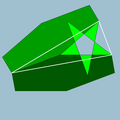 6.6.5/2 |
| Bowers acronym | Tiggy |
File:Truncated great icosahedron.stl
In geometry, the truncated great icosahedron (or great truncated icosahedron) is a nonconvex uniform polyhedron, indexed as U55. It has 32 faces (12 pentagrams and 20 hexagons), 90 edges, and 60 vertices.[1] It is given a Schläfli symbol t{3,5⁄2} or t0,1{3,5⁄2} as a truncated great icosahedron.
Cartesian coordinates
Cartesian coordinates for the vertices of a truncated great icosahedron centered at the origin are all the even permutations of
[math]\displaystyle{ \begin{array}{crccc} \Bigl(& \pm\,1,& 0,& \pm\,\frac{3}{\varphi} &\Bigr) \\ \Bigl(& \pm\,2,& \pm\,\frac{1}{\varphi},& \pm\,\frac{1}{\varphi^3} &\Bigr) \\ \Bigl(& \pm \bigl[1+\frac{1}{\varphi^2}\bigr],& \pm\,1,& \pm\,\frac{2}{\varphi} &\Bigr) \end{array} }[/math]
where [math]\displaystyle{ \varphi = \tfrac{1+\sqrt 5}{2} }[/math] is the golden ratio. Using [math]\displaystyle{ \tfrac{1}{\varphi^2} = 1 - \tfrac{1}{\varphi} }[/math] one verifies that all vertices are on a sphere, centered at the origin, with the radius squared equal to [math]\displaystyle{ 10-\tfrac{9}{\varphi}. }[/math] The edges have length 2.
Related polyhedra
This polyhedron is the truncation of the great icosahedron:
The truncated great stellated dodecahedron is a degenerate polyhedron, with 20 triangular faces from the truncated vertices, and 12 (hidden) pentagonal faces as truncations of the original pentagram faces, the latter forming a great dodecahedron inscribed within and sharing the edges of the icosahedron.
| Name | Great stellated dodecahedron |
Truncated great stellated dodecahedron | Great icosidodecahedron |
Truncated great icosahedron |
Great icosahedron |
|---|---|---|---|---|---|
| Coxeter-Dynkin diagram |
|||||
| Picture | 
|
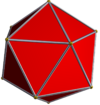
|

|
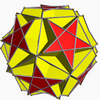
|

|
Great stellapentakis dodecahedron
| Great stellapentakis dodecahedron | |
|---|---|
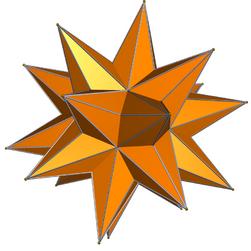
| |
| Type | Star polyhedron |
| Face | 
|
| Elements | F = 60, E = 90 V = 32 (χ = 2) |
| Symmetry group | Ih, [5,3], *532 |
| Index references | DU55 |
| dual polyhedron | Truncated great icosahedron |
File:Great stellapentakis dodecahedron.stl The great stellapentakis dodecahedron is a nonconvex isohedral polyhedron. It is the dual of the truncated great icosahedron. It has 60 intersecting triangular faces.
See also
References
- Wenninger, Magnus (1983), Dual Models, Cambridge University Press, doi:10.1017/CBO9780511569371, ISBN 978-0-521-54325-5
External links
- Weisstein, Eric W.. "Truncated great icosahedron". http://mathworld.wolfram.com/GreatTruncatedIcosahedron.html.
- Weisstein, Eric W.. "Great stellapentakis dodecahedron". http://mathworld.wolfram.com/GreatStellapentakisDodecahedron.html.
- Uniform polyhedra and duals
 |


